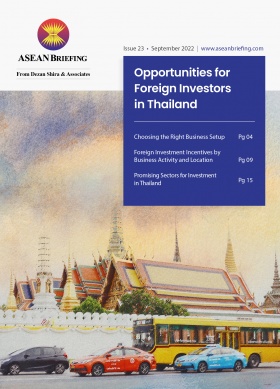Anwar Ibrahim Becomes Malaysian PM: Optimism for Businesses
Anwar Ibrahim became Malaysia’s 10th Prime Minister after the general election. Although the election ended in a hung parliament, the veteran statesman persuaded other coalitions to join his bloc to form a majority government. Yet, many see this as an unstable majority.
Upon hearing news of his appointment as PM, the Malaysian ringgit rallied and Malaysian shares saw the most significant rise in two years. Investors and businesses will be eager to hear his policies on tackling the rising cost of living, battling corruption, and plans for bureaucratic reforms.
Anwar Ibrahim, Chairman of the Pakatan Harapan (PH) coalition, was officially sworn in as Malaysia’s 10th Prime Minister on November 24, 2022. The veteran politician secures the country’s top post after an inconclusive general election and eventual intervention by Malaysia’s King, Sultan Abdullah Sultan Ahmad Shah.
The tightly contested election ended in a hung parliament, the first of its kind in Malaysia’s history. Pakatan Harapan secured the most seats with 82 in parliament, short of the 112 needed to govern the country. Behind PH was the Perikatan Nasional (PN), which won 73 seats. Barisan Nasional (BN) the coalition that ruled Malaysia from independence till 2018 suffered heavy losses and garnered far fewer seats than it did in 2018 with 30. Another major party, the Gabungan Parti Sarawak (GPS) (Sarawak Parties Alliance), won 23 seats. Other smaller parties made up the rest of the parliamentary seats.
The King took control of the process of forming a new government as no coalition had the 112-majority needed. The King also convened with Malaysia’s other royal households. Talk of a unity government quickly gained steam and the royal palace announced on November 24 that Anwar would be appointed as the new Prime Minister with his coalition being supported by BN, GPS, and a coalition from the state of Sarawak, Gabungan Rakyat Sarawak.
Business optimism and challenges
The appointment of Anwar Ibrahim as PM saw Malaysian stocks have their biggest jump in two years with the ringgit also surging 1.8 percent 4.4910 against the US dollar as markets reacted to the ending of the political impasse.
Foreign and local investors had expressed anxiety over the delay in forming the new government, particularly since Anwar is the fourth PM since 2018. Businesses will be eager to see how their government handles the rising cost of living, undertake bureaucratic reforms, and tackle the shortage of workers, especially for the palm oil and manufacturing industries. Export-reliant Malaysia, a key player in the global supply chain relies on millions of foreign workers for its manufacturing, plantation, and service jobs that are often shunned by locals as being dirty, difficult, or dangerous.
Approval of the 2023 state budget
Approving the 2023 budget will also be high on the new PM list. His predecessor Ismail Sabri Yakob did pass an US$80 billion budget for 2023 (the second largest in the nation’s history) before calling for a general election in the hopes that the benefits afforded to citizens (especially the Malays) would favor his BN coalition. The budget aims to lower taxes for those earning between 50,000 ringgit (US$10,500) to 70,000 ringgit (US$14,700) per year from 13 percent to 11 percent, and those earning 70,000 ringgit (US$14,700) to 100,000 ringgit (US$21,100) from 21 percent to 19 percent.
There is also an income tax reduction for MSMEs for their first 100,000 ringgit (US$21,100) in earnings from 17 percent to 15 percent, among a slew of other grants and loans for businesses. There are also tax handouts for low-income earners.
However, the budget will have to be tabled again by the new government when they come into power, meaning that many of the incentives could change.
Preventing the coalition from collapsing
Considering Malaysia’s political instability over the last four years, one of Anwar’s next challenges will be to keep his majority party coalition in parliament. As experienced with Malaysia’s previous Prime Ministers, their coalitions collapsed when parties switched allegiances.
On October 5, the government issued the ‘anti-hopping law’ to discourage such practices and now politicians who switch political parties will lose their seats in parliament thereby triggering a by-election. In 2020, the infamous Sheraton Move saw Parti Pribumi Bersatu Malaysia (BERSATU), the party headed by Muhyiddin Yassin, leave the Pakatan Harapan coalition less than two years after the general election in 2018, which then triggered a collapse of the government and resignation of then Prime Minister Mahathir Muhammad.
Under the new government’s power-sharing formula, Anwar Ibrahim will have to appease BN, GPS, and GRS while keeping his traditional coalition happy. It can thus be expected that BN candidates would be considered for the position of deputy Prime Minister.
About Us
ASEAN Briefing is produced by Dezan Shira & Associates. The firm assists foreign investors throughout Asia and maintains offices throughout ASEAN, including in Singapore, Hanoi, Ho Chi Minh City, and Da Nang in Vietnam, Munich, and Esen in Germany, Boston, and Salt Lake City in the United States, Milan, Conegliano, and Udine in Italy, in addition to Jakarta, and Batam in Indonesia. We also have partner firms in Malaysia, Bangladesh, the Philippines, and Thailand as well as our practices in China and India. Please contact us at asia@dezshira.com or visit our website at www.dezshira.com.







